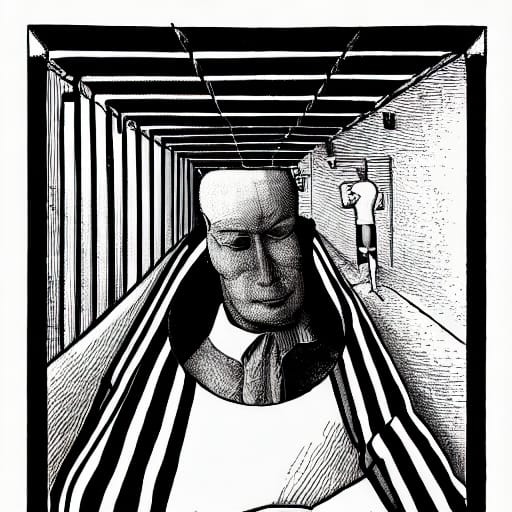Unraveling the Absurd: A Deeper Look into "The Stranger" by Albert Camus

Albert Camus, a prominent figure in existentialism and absurdism, crafted a literary masterpiece in "The Stranger" (or "L'Étranger" in its original French title). Published in 1942, this novella has continued to perplex and intrigue readers with its stark portrayal of a seemingly indifferent world and its protagonist, Meursault. In this blog post, we will embark on a philosophical journey to delve into the core of absurdism as portrayed in "The Stranger."
Absurdism: A Brief Overview
Often absurdist's are mistaken as existentialists, but there is a difference in the two philosophical ideas. At its essence, absurdism posits that human existence is fundamentally irrational, and our relentless search for meaning in a universe devoid of inherent purpose leads to existential absurdity. It's a philosophy that suggests life is a relentless cycle of repetition and futile efforts to find meaning.
The Indifference of Meursault
The story centers around Meursault, an emotionally detached and apathetic French Algerian who receives news of his mother's death. What sets Meursault apart is his apparent indifference to life's most profound events, including his mother's death. His detachment from emotional responses and social norms is evident throughout the novel.
Meursault's unemotional nature is perhaps best exemplified during his mother's funeral. He feels no grief, no sorrow, and displays no outward signs of mourning. When questioned about his lack of emotion, he responds with baffling honesty, stating that he "doesn't know" how he feels. This disconnection from conventional emotions showcases the absurdity of human existence as Camus saw it.
The Absurdity of Conventional Values
Camus deliberately crafts Meursault as a character who defies societal expectations and norms. He doesn't conform to conventional morality or values, and this non-conformity is at the heart of the absurdity in "The Stranger."
Meursault's trial, where he is accused of murder, serves as a profound example of the absurdity of human existence. He is not condemned solely for the act of killing but also for his perceived lack of remorse and conformity to societal norms. In a world driven by irrationality and the pursuit of meaning, Meursault's refusal to play the role society expects of him highlights the absurdity of those very expectations.
The Absurdity of Death
The absurdity of death is another theme that runs through "The Stranger." Meursault's detachment from life naturally extends to death, and he views both as equally arbitrary and devoid of meaning. When facing his own impending execution, he remains remarkably indifferent, concluding that life is inherently meaningless, and death is merely a formality and that is doesn't matter at what time you meet your death because it will come for everyone.
The Final Breakdown and Encounter with the Priest
As the novel reaches its climax, Meursault's final breakdown and his encounter with the priest epitomize the existential and absurdist themes woven throughout the narrative.
Meursault, imprisoned and awaiting his execution, is visited by a priest who seeks to offer him solace in religion. The priest represents conventional values, societal norms, and the pursuit of meaning through religion – all of which Meursault has consistently rejected throughout the story. Meursault's previous indifference to life, emotions, and social expectations come to a head in this encounter.
In a fit of frustration and rage, Meursault unleashes his pent-up emotions on the priest. He rejects the priest's attempts to offer salvation, vehemently asserting his atheism and the belief that life is inherently meaningless. This powerful outburst signifies Meursault's final affirmation of his absurd worldview.
Significance of Meursault's Rejection
Meursault's rejection of the priest's offer of salvation is significant for several reasons:
- Final Embrace of Absurdism: This moment symbolizes Meursault's complete embrace of absurdism. He rejects the notion of seeking meaning or salvation in religion, acknowledging that life is devoid of inherent purpose. Meursault's rejection of the priest is a final affirmation of his existential stance.
- Defiance of Societal Expectations: Throughout the novel, Meursault has consistently defied societal norms and expectations. His rejection of the priest is a final act of defiance, refusing to conform even in the face of death. It underscores the absurdity of adhering to societal values when they hold no real significance for him.
- Existential Freedom: Meursault's rejection of the priest also highlights his existential freedom. He exercises his autonomy by refusing to yield to external pressures, whether from the legal system or religious doctrine. In this act, he asserts his right to make choices, even if those choices lead to his eventual execution.
- Emotional Catharsis: Meursault's outburst serves as a rare moment of emotional release for him. It's as if, in his final moments, he allows himself to feel something, even if that feeling is anger and frustration. This emotional catharsis underscores the complexity of his character and the underlying emotional turmoil he has suppressed throughout the novel.
Meursault's final breakdown encapsulate the core themes of "The Stranger." They emphasize his unwavering commitment to absurdism, his defiance of societal expectations, his assertion of existential freedom, and his brief, poignant moment of emotional catharsis. In these concluding moments, Meursault's character remains consistent with Camus' exploration of the absurdity of human existence, challenging readers to confront the existential questions raised throughout the narrative.
Conclusion: Camus' Absurdist Vision
In "The Stranger," Albert Camus offers readers a stark, unapologetic glimpse into the philosophy of absurdism. Through the character of Meursault and his unemotional, non-conformist, and indifferent approach to life, Camus showcases the inherent absurdity of human existence in a world devoid of inherent meaning.
"The Stranger" challenges us to confront the uncomfortable truth that life often lacks clear purpose or reason. Camus forces us to question the meaning we ascribe to our own actions and existence. In this journey into absurdism, we are left with the haunting realization that the world is indifferent to our pursuits of meaning, leaving us to grapple with the inherent absurdity of our own lives.